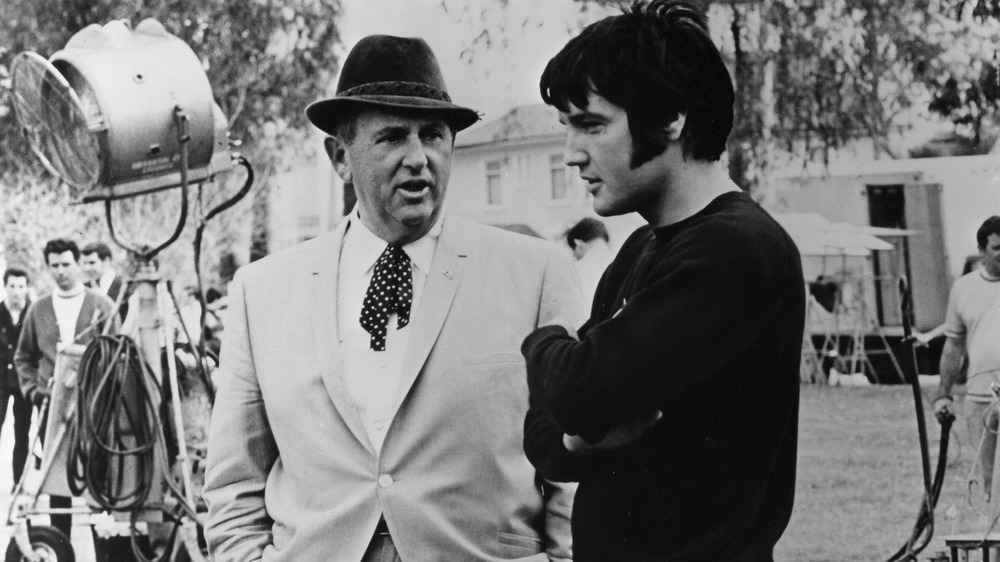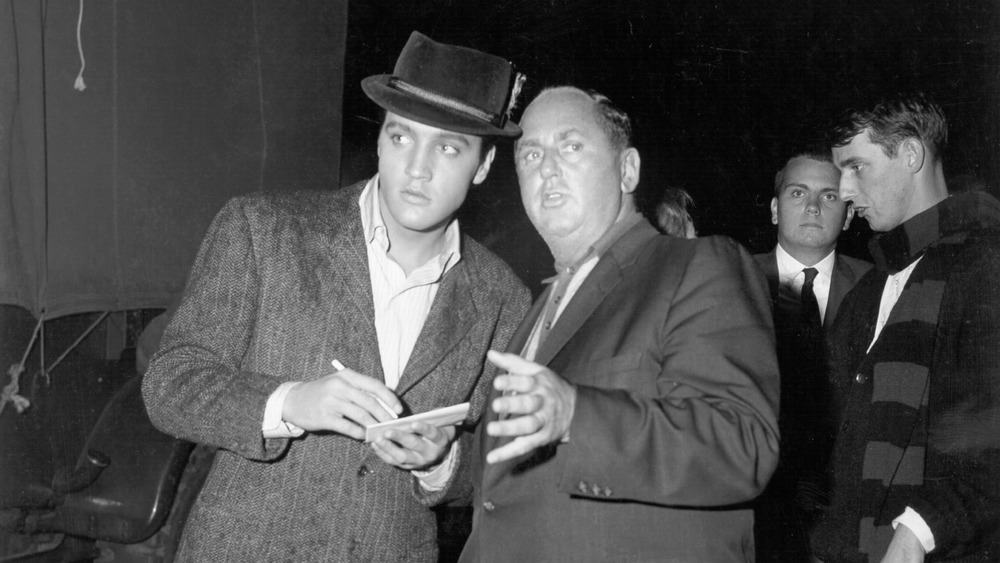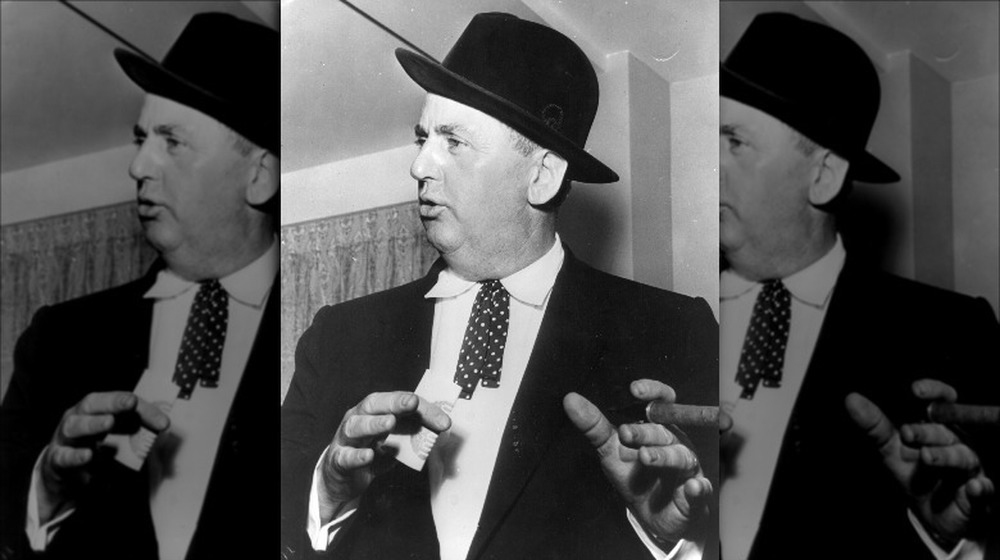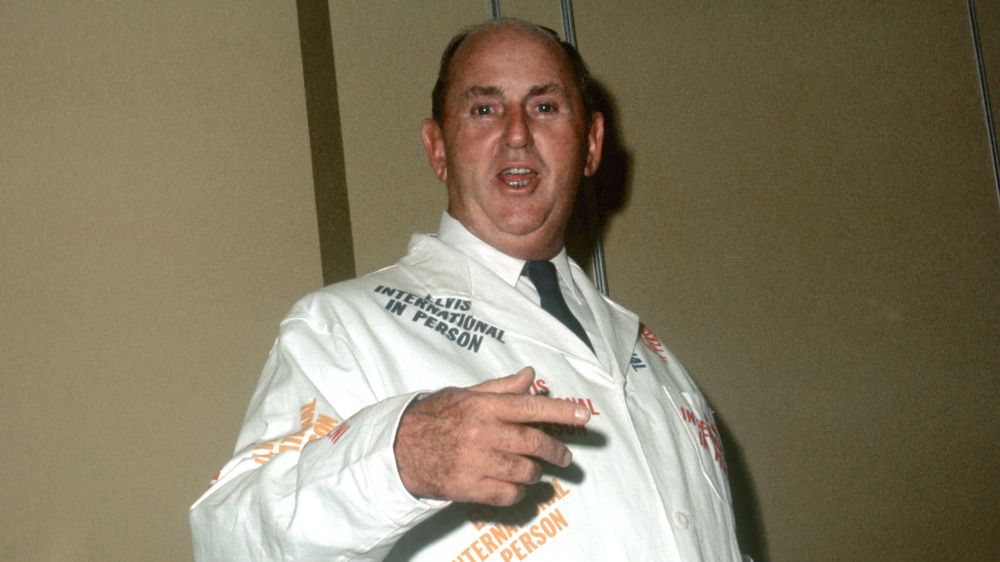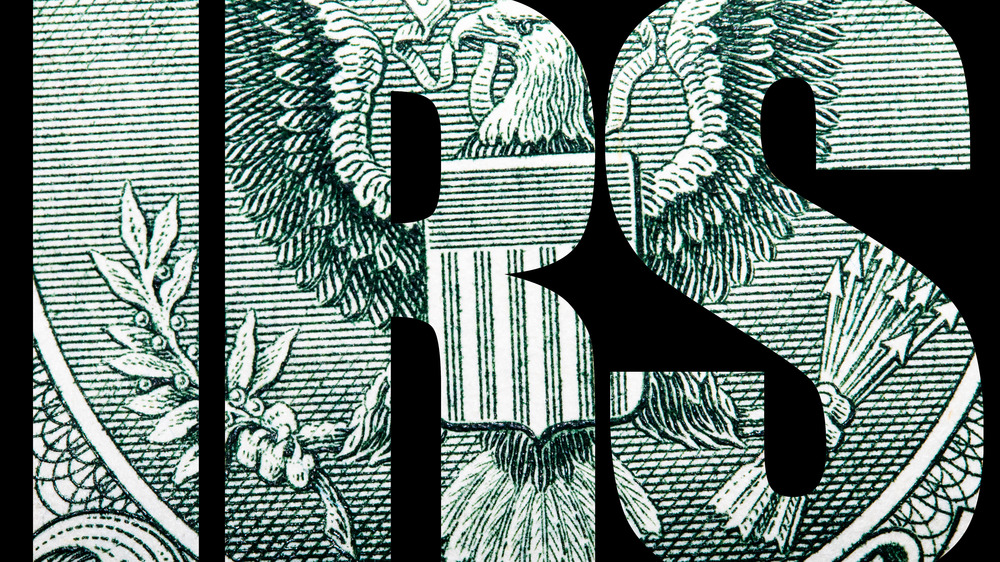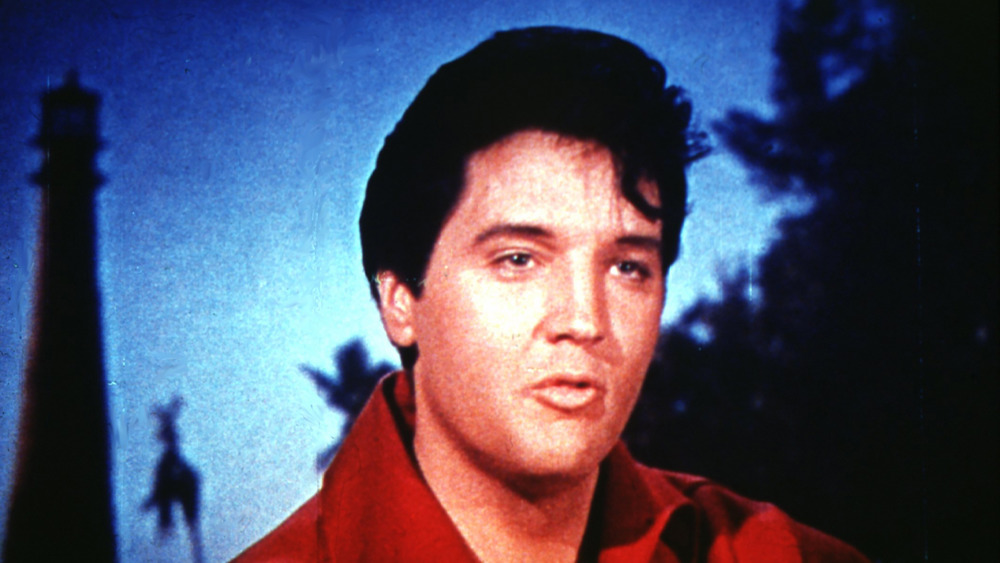The Truth About Elvis Presley's Manager
More than 40 years after his death, Elvis Presley remains one of the most famous and most easily recognized people in history. For the entirety of Presley's nearly 25-year career as "The King," his manager, "Colonel" Tom Parker, was the man who made all the career decisions. Frequently photographed with Presley, Parker became a celebrity in his own right, usually pictured chomping on a cigar.
Parker had a reputation for being incredibly protective of his relationship with Presley — and for isolating the singer and encouraging his descent into drug addiction and poor health, a cycle that resulted in Presley's early death at age 42. After incredible success in the 1950s, a period during which Presley came to define the new sound of rock and roll, his popularity plummeted in the 1960s after a stint in the Army and a series of lazy, poorly received films. Perception of Parker shifted, as he seemed to be mismanaging Presley's career into the ground, prioritizing short-term profits over long-term success.
All of that missed the point, however: Parker was an incredibly secretive man who managed to somehow remain mysterious despite spending decades as one of the most famous people in the country. Toward the end of his life, Parker began to lose control of both Elvis Presley's legacy and his own story, however, and today, we know the truth about Elvis Presley's manager.
Elvis' manager was an illegal immigrant
One of the most surprising things about Colonel Tom Parker is that he wasn't an American, he never held American citizenship, and his real name wasn't Tom Parker.
As Biography makes clear, Parker was actually born in the city of Breda in the Netherlands, making him Dutch. His real name was Andreas van Kuijk. When he was still in his teens, Andreas fled the Netherlands by ship, arriving in Canada and making his way to Hoboken, New Jersey. He worked with traveling carnivals and eventually got into music promotion, changing his name to Tom Parker (taking the name from his Army recruitment officer) and erasing any mention of his true origins.
Parker entered the country illegally and never took any steps to correct his status despite the fact that it would have been relatively easy to do so. As Smithsonian Magazine points out, the Alien Registration Act of 1940 basically offered amnesty to all illegal aliens, so becoming a naturalized citizen would have been pretty easy. And even if there were difficulties, by the 1960s, Parker was rich and famous and probably had the connections to get any problems smoothed out. Yet he never bothered and remained an illegal immigrant his entire life.
Elvis' manager totally lied about his past
Andreas Cornelis van Kuijk, aka Colonel Tom Parker, put a lot of effort into hiding his true identity and his past. As Smithsonian Magazine reports, van Kuijk, who was born in the Netherlands, created an elaborate fake past for himself. He claimed to have been born in Huntington, West Virginia. He maintained that his name was Thomas Andrew Parker and was happy to imply that his apparent rank of colonel stemmed from his service in the Army before World War II.
None of this was true. Parker did serve in the Army but only attained the rank of private — as Biography notes, his rank of colonel was ceremonial, bestowed on him by the governor of Louisiana in 1948 as a reward for his efforts on the election campaign.
What's truly remarkable about van Kuijk's deception is how long it lasted. Parker became one of the most famous people in the world, amassed a huge fortune, and negotiated huge deals on Presley's behalf — often making business enemies as he went due to his hard-nosed style. (He once famously quipped that a multimillion-dollar offer was fine for him and then inquired how much Presley would get.) Yet no one ever thought to investigate the Colonel's past. The truth of his life didn't come out until Parker was in his seventies and Presley long dead.
Elvis' manager was diagnosed as a psychopath
Biography tells us that after emigrating illegally to the United States from the Netherlands in the 1920s, Colonel Tom Parker eventually joined the U.S. Army in 1929. He served two years without incident and then re-enlisted in 1931. His second stint in the Army didn't go so well: Smithsonian Magazine reports that he walked off his post and was officially declared "absent without leave" (AWOL) in 1932. He was quickly arrested and spent a few months in military prison.
His stay in prison was harsh (the Army not being known for its leniency toward deserters), and he was kept in solitary confinement for months. This took a mental toll on Parker. As The New York Times notes, Parker was eventually simply discharged from the Army — but only after suffering some sort of "breakdown." The Washington Post reports that he spent several months recuperating at Walter Reed Army Hospital and was officially diagnosed as being in a "Constitutional Psychopathic State" and released from the armed forces that year.
Considering how Parker lied about every aspect of his life, it's certainly possible that his "psychotic state" was a convenient way to escape his service when simply walking away hadn't worked out for him. But it's also possible that the man who managed the most famous singer in rock history was a true psychopath.
Elvis' manager dodged the draft — by eating
When World War II erupted, plunging the whole world into bloody conflict, the U.S. Army needed a lot of men in a very short time, and most people were more than willing to step up and answer the draft. Plenty of men of all ages chose not to wait for the draft and volunteered for service.
As a veteran — even a veteran with a stain on his record — Parker would have been an ideal choice for the draft. But Parker's first experience with the Army had ended with desertion and a his being diagnosed as a psychopath, and this had left him with little apparent desire to repeat the experience, especially if it involved leaving the country and being shot at. As Smithsonian Magazine reports, Parker had apparently had all he could take of Army life and took steps to avoid serving his adopted country. Those steps mostly involved eating.
Even in times of war, the Army has some strict standards about the physical condition of its soldiers, so Parker's brilliant plan to avoid the draft involved gaining weight. Shared.com confirms that Parker's weight program worked perfectly — he soon weighed around 300 pounds, more than enough to be classified morbidly obese and unfit for service.
Elvis' manager was terrified to leave the country
Colonel Tom Parker had swagger. As the manager of the biggest musical star in the world, he could afford to bluster, often bragging about being in charge of Presley's career — and earning the lion's share of the income. But Parker was also a very scared man who sacrificed millions in potential earnings because, as writer Alanna Nash reports, he didn't have a passport and was afraid to let Presley tour overseas without him.
Rare notes that despite being a superstar, Elvis Presley only toured outside the U.S. three times — all in 1957, and all in Canada. And, notably, Parker did not accompany Presley on the trip, fearing being exposed as an illegal immigrant with an assumed name. After that, Parker consistently turned down offers for Presley to tour in Europe and Japan, deals often worth millions of dollars. As The Washington Post notes, British music promoter Harvey Goldsmith said flat out that when he tried to sign Presley to a performance in England, Parker told him privately it would never happen because he was afraid to leave the U.S.
The Washington Post also reminds us that this cost Presley — whose estate was worth just $7 million when he died — a great deal of money. If Parker hadn't been so paranoid about Presley being outside of his direct control, The King would have earned a lot more money.
Elvis' manager let the IRS do his taxes
Elvis' manager was obsessed with money and reveled in the sheer amount of it he could extract from his only client's enormous success. As The Washington Post notes, Parker took home a hefty fee for managing Presley's career. Where normal manager fees were in the 10- to 15- percent range, Presley agreed to a 25-percent fee when he signed with Parker in the 1950s and signed a new agreement in the 1960s that raised his fee to an incredible 50 percent. And throughout the 1960s, Parker forced Presley to appear in a series of truly awful films simply because they made money even as they arguably destroyed Elvis' credibility as a musician.
Most rich people seek ways to lower their tax burden, but despite his greed, Parker never made any move to get creative with his taxes. In fact, as writer Alanna Nash reports, Parker went so far as to actually let the IRS calculate his and Presley's tax debts for him and professed to be happy to pay it.
According Smithsonian Magazine, the reason for this attitude is the same reason Parker refused to travel internationally and why he usually settled lawsuits instead of taking the chance of being forced to testify under oath: He was terrified that his status as an illegal immigrant would be revealed.
Elvis' manager may have been a murderer
One of the biggest mysteries surrounding Colonel Tom Parker is his extreme paranoia and secrecy. It's true he was an illegal immigrant living under an assumed name and therefore had a legitimate reason to worry about any involvement with law enforcement, but as Smithsonian Magazine points out, he could have cleared up his immigration status fairly easily. So why was he so worried about his true identity as Andreas van Kuijk coming out? Possibly because he was a murderer.
As writer Alanna Nash notes, a reporter in Parker's home country of the Netherlands received an anonymous letter stating that he "murdered the wife of a greengrocer on the Bochstraat in Breda." And, in fact, there is an unsolved murder in Bochstraat that fits the timeline of Parker's movements: In 1929, a woman named Anna van den Enden was beaten to death behind her husband's grocery store. The crime scene showed evidence of a search for money and valuables, and an effort had been made to obscure physical evidence.
There's no way to know if the man who would become Elvis' manager was Anna van den Enden's killer. The police investigation uncovered no clues, and it's impossible to place Parker in any specific place in 1929. But it certainly would explain Parker's hurried exit from his home country and his fevered secrecy and worry over his true identity.
Parker used Elvis to fund his gambling and lifestyle
Managing the world's biggest musical act isn't the most difficult job: Elvis Presley was one of the most in-demand artists in the world, and the offers literally came to Colonel Tom Parker no matter what he did. Yet Parker soaked Elvis for an enormous amount of money. As The Washington Post notes, by 1966, Parker was earning 50 percent of Elvis' paychecks, and in 1973, Parker sold the rights to Presley's recording catalog to RCA for a low-ball $5.4 million.
One reason Parker needed all that money was his gambling — and as the Daily Express reports, he may have contributed to Presley's early death by pushing the singer to perform two shows a night, seven days a week, for his Las Vegas residencies in order to keep the cash coming. With Elvis in Las Vegas, Parker ran up enormous debts with the casinos and was focused on keeping Presley working constantly so he could cover his debts.
Elvis' decline during this period is obvious. As Billboard notes, the physical and mental strain drove him to abuse several prescription medications. He gained weight and looked awful, sweating through his rhinestone jumpsuits.
Tom Parker held back Elvis' movie career
Elvis was known for many things: launching rock and roll into the mainstream, scandalizing folks with his hip gyrations, rhinestone-studded jumpsuits — and some really, really awful movies.
Colonel Tom Parker signed Elvis to these terrible films for a simple reason: As The Conversation points out, they made buckets of money — $2.2 billion in domestic gross alone. Add in the soundtrack royalties and the free publicity for Elvis' records, and it's easy to see why Parker ignored his client's pleas for better scripts.
And those better scripts were out there — and offered to Presley. According to The Washington Post, Parker turned down offers for Presley to star in several films that went on to be huge hits and establish their stars as legitimate actors. Elvis could have played the lead in West Side Story, for example, or the role that made Jon Voight a star in Midnight Cowboy. He was also offered the Kris Kristofferson role in the 1976 version of A Star is Born. Parker turned down all these roles because he preferred the safe money and was very protective of Presley's image. But trapping Presley in films of lesser and lesser quality not only frustrated The King but also meant that while rock music was being revolutionized by the Beatles and the Rolling Stones, Elvis Presley was singing songs like "Yoga is as Yoga Does."
Colonel Tom Parker made more money than Elvis
Elvis Presley was huge. The Daily Express estimated that he earned as much as a billion dollars over the course of his career. As the Los Angeles Times points out, his manager, Colonel Tom Parker, knew that Elvis' brand was so powerful that he could earn millions at any moment simply by booking a tour, recording an album, or appearing in a film. And for every dollar Elvis earned, Tom Parker took a piece.
That's standard. Most managers earn between 10 and 15 percent of what their clients make — but from the very beginning, Parker soaked his only client for more. Their original contract gave Parker an unheard-of 25 percent of Presley's earnings — and he was eventually getting an astounding 50 percent. The new contract also allowed Parker to charge additional fees for services he provided, eating away at the money that should have gone to Elvis instead.
Eventually, this uneven arrangement led to a truly incredible scenario: Elvis Presley's manager made more money than Elvis himself. As The Washington Post notes, in 1973, Parker sold the rights to Presley's recording catalog to RCA for a measly $5.4 million — and earned $1.5 million more than Presley in the deal.
A shocked judge removed Parker from Presley's estate
One inescapable conclusion from even a cursory examination of the way Colonel Tom Parker handled Elvis Presley's career is that the Colonel robbed his client blind over the course of two and a half decades. From his exorbitant 50-percent fee for his services to a multitude of deals where he actually made more money than his client, Parker violated plenty of ethical rules, even if Presley willingly signed the contracts.
After Elvis' death in 1977, however, Parker's hold on Presley's money finally began to slip. As the Los Angeles Times reports, when Priscilla Presley, Elvis' ex-wife, sat down to go over the estate in 1979, she was shocked to discover it was a failing enterprise — revenues had fallen to just $1 million that year and were expected to fall to less than $500,000. Tax bills and other expenses were eating up every dollar The King had left behind, and there were no more tours, records, or films to bring in more cash.
So she did the only sensible thing she could do: She sued Presley's manager, Colonel Tom Parker, in order to sever him from the estate and gain full control — and she won. As The Washington Post reports, the judge in the suit was so shocked by what he saw that he said Parker was "guilty of self-dealing and overreaching" and barred him from any involvement with the estate going forward.
Elvis' manager was finally exposed
Andreas van Kuijk kept up his false identity for decades, but eventually, at least part of the truth caught up with him. As noted by The Washington Post, in 1981, Albert Goldman published a biography of Elvis Presley that was pretty scathing in its portrayal of Parker — and exposed his true identity to the world. At the same time, Parker was being sued by Priscilla Presley, and his dubious financial and ethical behavior toward one of the world's most beloved performers was being detailed.
Parker began to worry that he might be charged with crimes stemming from any number of these misdeeds and suddenly decided that his illegal entry into the United States in the 1920s was a positive instead of a negative. As CMT News reports, in order to slow down any attempt to bring criminal charges against him, Parker officially claimed that he was a citizen of no nation — a man without a country — and thus not subject to any country's laws. His reasoning was that he'd served in the U.S. military without permission from the Dutch government and thus had forfeited his Dutch citizenship. Since he'd never been naturalized as a U.S. citizen, either, he wasn't a subject of either country.
The theory was never tested. Parker died in 1997, 87 years old and having gambled away most of his money.
